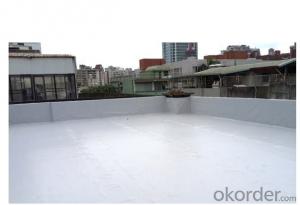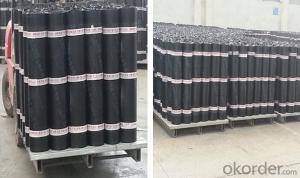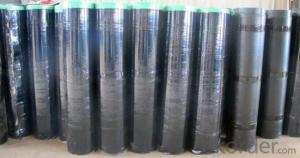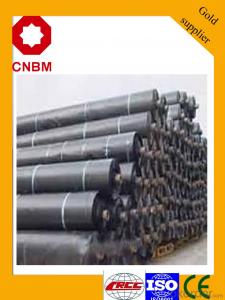SBS-Modified Bitumen Waterproof Membrane with Polyester Fiber and PE Film Type I,4mm
- Loading Port:
- Tianjin
- Payment Terms:
- TT OR LC
- Min Order Qty:
- 1000 m²
- Supply Capability:
- 500000 m²/month
OKorder Service Pledge
OKorder Financial Service
You Might Also Like
SBS-PYPE is a waterproofing modified bitumen base sheet consisting of styrene-butadiene-styrene (SBS) modified asphalt reinforced with polyester fiber covering with polyethylene surfacing. There have two kinds of thickness: 3 mm, 4 mm。
We have two kinds of type in our company。They are I type and II type。They have differentt kinds of low temperature flexibility。
This type is 4mm thickness,type I。
If you want to know more about us,call the salesman of CNBM International Corporation (CNBM International) 。
CNBM INTERNATIONAL CORPORATION
Address:17th Floor, NO.4 Building, Zhuyu Business Center, Shouti South Road,Haidian District, Beijing,China
Post Code:100048
Tel:(86-10)68796888
Fax:(86-10) 68796668
Email:marketing@okorder.com, hr@okorder.com
- Q: Can a waterproofing membrane be used in areas with vehicular traffic?
- Certainly! It is indeed possible to utilize a waterproofing membrane in regions frequented by vehicles. In reality, there exist distinct variants of waterproofing membranes meticulously crafted to endure the pressure and motion exerted by automobiles. These specialized membranes, referred to as vehicular or traffic-bearing membranes, are generally composed of sturdier materials like rubberized asphalt or modified bitumen. They are purposefully engineered to furnish a robust and flexible barricade against water and moisture, whilst simultaneously withstanding the burdensome loads and incessant traffic commonly associated with vehicles. Vehicular membranes find widespread application in parking garages, bridges, and other sites where vehicles are commonly found.
- Q: Coil waterproof roofing requirements
- 4, the female wall to leave a waterproof membrane head groove, the height of the project after the completion of the requirements of more than 300 flood height, the general height of 400-500 is appropriate.
- Q: Can a waterproofing membrane be used in tunnels?
- Indeed, tunnels can indeed employ a waterproofing membrane. These membranes are frequently utilized in tunnels to thwart water infiltration and safeguard the structure from water-related harm. Generally composed of materials like bitumen, PVC, or polyurethane, these membranes possess impermeability to water as a core characteristic. When properly applied, a waterproofing membrane can act as a formidable barrier against water infiltration, thereby preserving the tunnel's integrity and avoiding expensive structural impairment. Furthermore, apart from their water-resistant properties, waterproofing membranes also provide defense against other substances like chemicals and gases, rendering them a versatile remedy for both tunnel construction and upkeep.
- Q: Can a waterproofing membrane be used for a swimming pool?
- Yes, a waterproofing membrane can be used for a swimming pool. Waterproofing membranes are commonly used in construction to prevent water penetration and leakage. When applied to the walls and floor of a swimming pool, a waterproofing membrane creates a barrier that prevents water from seeping into the surrounding structures. This is crucial for maintaining the integrity of the pool and preventing damage to the surrounding areas. Waterproofing membranes for swimming pools are specifically designed to withstand the constant exposure to water and chemicals, ensuring long-lasting protection.
- Q: Are waterproofing membranes environmentally friendly?
- Waterproofing membranes can vary in their environmental impact depending on the materials used. Some waterproofing membranes, such as those made from recycled materials or natural substances, can be considered more environmentally friendly. However, other membranes made from synthetic materials or those containing harmful chemicals may have a negative impact on the environment. It is essential to consider the specific type of membrane and its composition to determine its overall environmental friendliness.
- Q: Does a waterproofing membrane require a topcoat or sealer?
- In order to provide extra protection and enhance its effectiveness, a topcoat or sealer is typically required for a waterproofing membrane. The membrane itself is meant to prevent water from penetrating, but applying a topcoat or sealer can further strengthen its ability to repel water and prolong its lifespan. The topcoat or sealer functions as an additional layer of defense against moisture, UV rays, and other potential causes of damage. Moreover, it can help seal any minor cracks or imperfections in the membrane, ensuring a tighter seal and reducing the risk of water infiltration. Therefore, while a waterproofing membrane can offer some level of protection independently, it is generally recommended to add a topcoat or sealer for optimal performance and longevity.
- Q: Are waterproofing membranes resistant to thermal expansion?
- Yes, waterproofing membranes are typically resistant to thermal expansion. They are designed to withstand temperature changes without undergoing significant dimensional changes, ensuring their effectiveness in preventing water penetration and maintaining their integrity.
- Q: Can a waterproofing membrane be used for food processing facilities?
- Yes, a waterproofing membrane can be used for food processing facilities. These membranes are specifically designed to prevent water penetration and can be installed in areas where food is processed to ensure a hygienic and moisture-resistant environment.
- Q: Can a waterproofing membrane be used for foundation walls and footings?
- Yes, a waterproofing membrane can be used for foundation walls and footings. A waterproofing membrane is a thin layer of material, typically made of rubberized asphalt or polymer-modified bitumen, that is applied to the exterior surface of foundation walls and footings to prevent water penetration. It acts as a barrier, preventing water from seeping into the foundation and causing moisture-related issues such as dampness, mold, and structural damage. The waterproofing membrane is typically applied to the foundation walls and footings during the construction phase, either before or after the concrete is poured. It is important to ensure that the membrane is properly installed and sealed to provide effective waterproofing. The membrane is also commonly combined with other waterproofing techniques such as drainage systems and sump pumps to provide comprehensive protection against water intrusion. Using a waterproofing membrane for foundation walls and footings is a common practice in construction, especially in areas with high water tables or heavy rainfall. It is an effective and reliable method to prevent water damage and increase the longevity of the foundation. Properly waterproofing the foundation walls and footings is essential for maintaining a dry and structurally sound building.
- Q: Can a waterproofing membrane be used on precast brick block surfaces?
- Precast brick block surfaces can indeed benefit from the application of a waterproofing membrane. Such a membrane serves as a protective shield, safeguarding the bricks against water infiltration, which could otherwise lead to undesirable consequences like cracks, efflorescence, or the growth of mold. It is crucial to select a waterproofing membrane explicitly designed for masonry surfaces, as these membranes are specially formulated to adhere perfectly to the distinct properties of brick and block materials. Moreover, to guarantee the membrane's effectiveness, it is essential to adhere to proper surface preparation and application techniques.
Send your message to us
SBS-Modified Bitumen Waterproof Membrane with Polyester Fiber and PE Film Type I,4mm
- Loading Port:
- Tianjin
- Payment Terms:
- TT OR LC
- Min Order Qty:
- 1000 m²
- Supply Capability:
- 500000 m²/month
OKorder Service Pledge
OKorder Financial Service
Similar products
Hot products
Hot Searches
Related keywords























